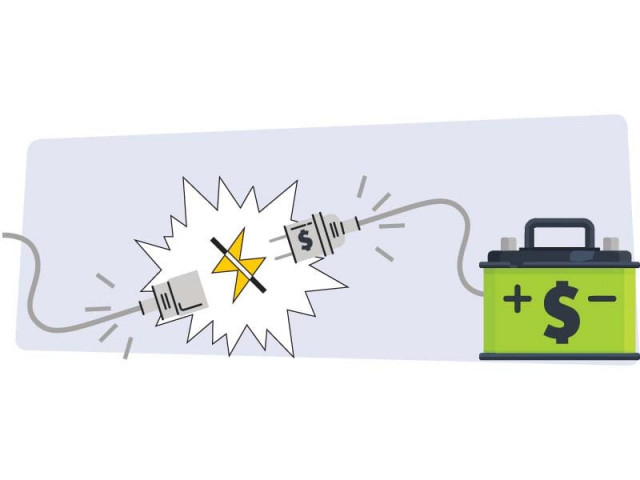Rs975b power subsidies proposed
Energy ministry had demanded Rs1.54 trillion - 70% more than this year’s revised budget

The Ministry of Finance has refused to pay for the cost of inefficiency or for clearing arrears of the China-Pakistan Economic Corridor (CPEC) energy projects and has instead proposed subsidies worth over Rs975 billion for the power sector, 37% less than the money demanded.
Sources say, after a meeting between the Ministry of Finance and the Ministry of Energy, the Q-Block has recommended over Rs975 billion in power subsidies for fiscal year 2023-24, starting from July. The recommended funds will mostly cover the cost of difference between consumer price and generation cost, and subsidies for Azad Jammu and Kashmir (AJK).
At this point in time, the finance ministry has not entertained the Power Division’s demand for Rs200 billion in CPEC arrears, said the sources, adding that the ministry has, however, agreed to give Rs48 billion to clear up to 87% of the current power generation bills of the CPEC power plants.
It is to note that the outstanding CPEC dues are one of the irritants in the way of smooth Pak-China economic relations.
Additionally, the finance ministry did not allocate any funds to bear the cost of inefficiency witnessed in Quetta Electricity Supply Company (QESCO) and in the AJK areas. Funds for the Kissan package, exporters subsidies and to compensate for the inefficiencies of the energy ministry, due to its failure to collect due electricity bills from the federal and the provincial government, have also not been proposed.
The Ministry of Energy had demanded Rs1.54 trillion in power subsidies for the next fiscal year, a colossal amount that is 70% more than this year’s revised budget. The demand was surprising since the government has twice increased electricity tariffs in the outgoing fiscal year in order to reduce subsidies and control circular debt.
The Pakistan Muslim League-Nawaz (PML-N) led coalition government has already increased electricity tariffs twice; first in July last year and then in February this year.
The proposed subsidies are Rs563 billion, or 37%, less than the initial amount demand by the energy ministry. The offered amount, however, is still Rs70 billion or 8% higher than the upward revised power sector subsidies for the current fiscal year.
Sources have said that the Rs975 billion figure is not yet final, as the matter is expected to be taken up with the finance minister and Prime Minister Shehbaz Sharif.
There are, however, transparency and accuracy related concerns about electricity subsidy claims for the erstwhile Federally Administered Tribal Areas (FATA) and the domestic and agricultural consumers of Balochistan. The Power Division had demanded subsidies worth Rs48 billion for the ex-FATA areas but the Ministry of Finance has offered Rs25 billion, with another Rs14 billion is committed to clear electricity arrears.
Since the federally administered areas have been merged with Khyber-Pakhtunkhwa (K-P) there is a need to end unlimited power subsidies. The federal government has also been picking up the additional cost to end any disparities in the economic development of the area.
The Ministry of Energy had demanded Rs164 billion as price differential subsidy for the government-run power distribution companies but the finance ministry has indicated fund worth Rs150 billion.
Apart from that, Rs170 billion is being indicated to pick up the cost of subsidies for K-Electric consumers. Similarly, Rs7 billion has been indicated to settle the arrears of the prime minister’s Industrial Support Package for KE consumers in the next fiscal year.
The finance ministry has not committed Rs195 billion requested as a special subsidy for QESCO on account of tube-wells. It has also not indicated any funds for the cost of inefficiency of the distribution company. The power division has demanded Rs65 billion as the price differential subsidy on account of less recoveries from the consumers.
The federal government has been paying its share of agriculture tube-well subsidies but the Ministry of Energy is unable to instil efficiency in the distribution company.
The ministry also sought a staggering Rs102 billion to clear arrears of AJK consumers who are already availing highly subsidised electricity. The energy ministry seems reluctant to implement a decision to charge the electricity tariffs from the AJK consumers applicable in other parts of the country. The finance ministry, however, has proposed only Rs55 billion. Against another demand of Rs62 billion for the AJK subsidy -an amount of Rs25 billion has been proposed by the finance ministry.
Strangely, the Ministry of Energy had demanded a subsidy worth Rs47 billion to clear the backlog of the federal government and the provincial governments’ bills. The finance ministry has refused these funds.
Subsidies worth Rs262 billion has been indicated to pay the dues of private power producers under a three-year-old deal.
Published in The Express Tribune, May 12th, 2023.
Like Business on Facebook, follow @TribuneBiz on Twitter to stay informed and join in the conversation.



















COMMENTS
Comments are moderated and generally will be posted if they are on-topic and not abusive.
For more information, please see our Comments FAQ